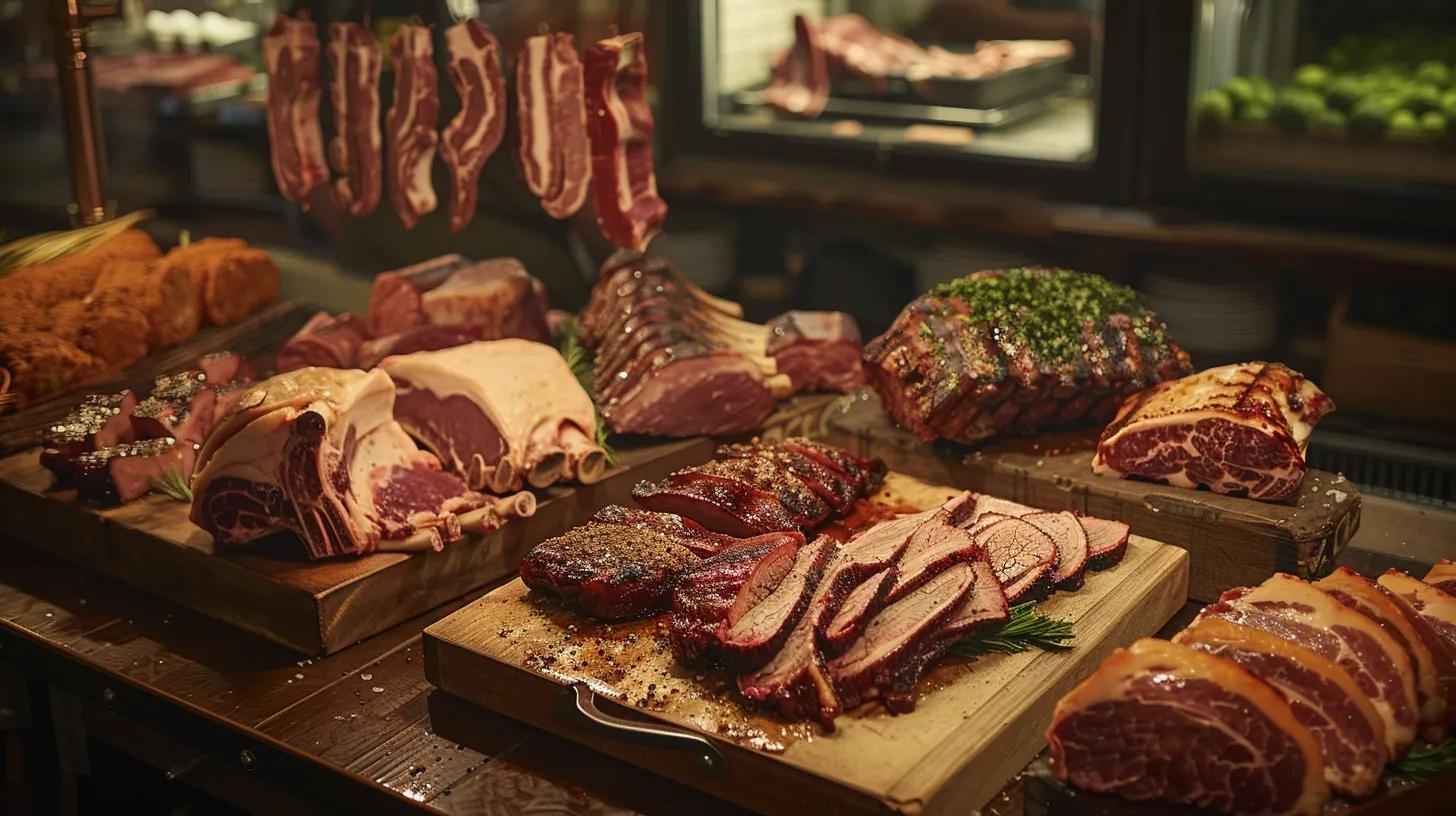When searching for a reliable meat market near you, understanding what to look for can be challenging. Quality, customer service, and pricing are crucial factors that impact your overall satisfaction. This article will examine how to evaluate the quality of meat products, investigate supplier certifications, and analyze customer reviews. By addressing these points, readers will learn how to choose fresh, high-quality meats while potentially benefiting from free delivery options. Ultimately, the insights gained here will help make informed decisions, ensuring that your meat needs are met effectively and satisfactorily.
Evaluating Reliable Meat Suppliers
- Freshness and sourcing practices are crucial when choosing quality meat suppliers
- Transparency in supply chains builds trust and assures customers of product quality
- Certifications validate ethical farming practices and enhance overall meat quality
- Strong customer service and clear policies foster loyalty and positive buyer experiences
- Engaging local suppliers supports community values while ensuring high-quality, freshmeat products
Evaluate the Quality of Meat Products Offered by Suppliers

Evaluating the quality of meat products from suppliers requires attention to several key factors. It is essential to assess the freshness and sourcing practices of our specialties, ensuring that meats like brisket and bacon come from reputable farms that utilize pasture-based practices. Additionally, understanding the variety of cuts offered enhances selection. Transparency in supply chains in a reputable meat market near me further solidifies trust in the quality of the products available.
Assess the Freshness and Sourcing Practices
Freshness is a crucial element when evaluating meat suppliers, as it significantly impacts the taste and quality of products like ground beef and steaks. Suppliers should transparently showcase their sourcing practices, ensuring that the meat they provide comes from reputable farms that prioritize animal welfare and sustainable practices. Choosing a supplier that offers freshly butchered options allows consumers to add to cart items that reflect superior taste and texture, making meals more enjoyable.
Moreover, sourcing practices should be closely examined when selecting suppliers. Good meat comes from animals raised in healthy environments, contributing to its overall flavor. Ground meat, for instance, should be processed shortly after butchering to maintain its freshness and quality. Suppliers that emphasize these standards not only enhance the eating experience but also foster trust with their customers, who seek high-quality options for their culinary needs.
Consider the Variety of Meat Selections Available
When selecting nearby meat suppliers, it is vital to consider the variety of meat selections available, as this can greatly influence culinary experiences. A diverse offering of products—such as various cuts of pork, sausage, poultry, and even bison—enables home cooks to experiment with different recipes and cooking techniques. Whether preparing a classic roast or grilling sausages for a summer barbecue, having access to a broad range of meats helps ensure that every meal can be customized to taste.
A reputable butcher shop should not only provide the basics but also specialty items that cater to various dietary preferences and culinary styles. For instance, customers may seek unique options such as free-range poultry or grass-fed bison to meet their specific needs. By offering a wide selection, suppliers can enhance customer satisfaction and encourage repeat visits, making it easier for individuals and families to find the perfect meat for their dishes:
| Meat Type | Culinary Use |
|---|---|
| Pork | Roasting, grilling, and sausages |
| Poultry | Broiling, roasting, and frying |
| Bison | Grilling, stewing, and ground meat recipes |
| Sausage | Grilling, breakfast dishes, and casseroles |
Understand the Importance of Transparency in Supply Chains
Transparency in supply chains is essential when purchasing meat products. Consumers should be able to trace the origin of cuts like sirloin steak, ham, and ground meat, which assures them of the quality and standards upheld during production. Suppliers that communicate their sourcing methods help build trust, allowing customers to make informed choices when filling their carts with meat.
Moreover, understanding the journey of meat from farm to table informs buyers about animal welfare and environmental practices of suppliers. This knowledge not only enhances the dining experience but also appeals to values regarding sustainable practices. Customers can feel confident in their choices, knowing they are supporting ethical suppliers while enjoying high-quality cuts from reputable sources.
| Meat Type | Culinary Use |
|---|---|
| Pork | Roasting, grilling, and sausages |
| Poultry | Broiling, roasting, and frying |
| Bison | Grilling, stewing, and ground meat recipes |
| Sausage | Grilling, breakfast dishes, and casseroles |
The quality of the meat lies not just in the cut but in the hands that provide it. Next, uncover the certifications and standards that define the trustworthiness of these suppliers.
Investigate Supplier Certifications and Standards

When evaluating nearby meat suppliers, it is essential to investigate their certifications and standards. Look for USDA and local health department certifications that ensure compliance with safety protocols. Additionally, organic and grass-fed certifications indicate higher quality practices. Verifying animal welfare standards in their operations reinforces trust in the ethical treatment of livestock, impacting overall meat quality and consumer satisfaction.
Look for USDA and Local Health Department Certifications
When selecting nearby meat suppliers, checking for USDA and local health department certifications is vital. These certifications confirm that suppliers adhere to established safety protocols, ensuring the meat is processed and handled under strict hygiene standards. Customers can feel at ease knowing that their chosen butcher shop is compliant with government regulations, which helps maintain overall meat quality and safety.
Beyond basic compliance, organic and grass-fed certifications further elevate the credibility of meat suppliers. These designations indicate that the meat comes from animals raised with higher welfare standards, which often translates to better flavor and nutritional value. By choosing suppliers with recognized certifications, consumers can make informed decisions that align with their health needs and culinary preferences.
Explore Organic and Grass-Fed Certifications
Organic and grass-fed certifications are vital indicators of meat quality and ethical farming practices. When a supplier offers organic meat, it signifies that the animals were raised without the use of antibiotics or growth hormones and were fed an organic diet. Grass-fed certification, on the other hand, ensures that livestock grazed on pasture for the majority of their lives, leading to healthier animals and, as a result, superior flavor and nutritional benefits in the meat.
Consumers looking for high-quality meat products should prioritize suppliers that proudly display these certifications. By selecting a butcher shop that adheres to organic and grass-fed standards, individuals not only support sustainable agricultural practices but also enhance their meals with richer and more complex flavors. Identifying such suppliers can be crucial for health-conscious families seeking options that align with their dietary needs:
| Certification Type | Benefits |
|---|---|
| Organic | Free from antibiotics and growth hormones; feed from organic sources |
| Grass-Fed | Higher omega-3 fatty acid content; improved flavor and tenderness |
Verify Animal Welfare Standards in Practices
Ensuring strong animal welfare standards is key when evaluating meat suppliers. Suppliers who prioritize the well-being of their livestock typically adhere to ethical practices that contribute to higher meat quality. Factors such as humane treatment, access to pasture, and a stress-free environment positively impact the flavor and texture of the meat products offered. Customers looking for quality meat should inquire about these practices to align their values with their purchasing decisions.
Furthermore, verifying animal welfare standards can provide insights into the overall operations of suppliers. Suppliers with certifications that focus on humane treatment often share information about their farming practices, which can reassure consumers of their commitment to ethical sourcing. This transparency not only fosters trust but also enhances customer satisfaction by ensuring that the meat purchased reflects a higher standard of care and quality. Consider these aspects when selecting nearby meat suppliers:
- Humane treatment of livestock
- Access to pasture for animals
- Clear communication of farming practices
Once the certifications are clear, the next step is assessing how well the suppliers treat their customers. Strong relationships often lead to better products and service, and understanding this dynamic is key.
Analyze Customer Service and Supplier Relationship

When evaluating nearby meat suppliers, it is important to analyze customer service and the overall supplier relationship. This involves assessing supplier responsiveness and communication, which directly impacts the buying experience. Understanding return and refund policies is crucial for consumer confidence, while reviewing customer service availability ensures that support is accessible when needed. These aspects collectively contribute to a satisfactory relationship with suppliers.
Evaluate Supplier Responsiveness and Communication
Supplier responsiveness plays a critical role in the overall customer experience when selecting nearby meat suppliers. Timely communication regarding order status, inventory availability, and any potential issues enhances trust and assures customers that their needs are being prioritized. For instance, a supplier that promptly answers inquiries or provides updates demonstrates a commitment to service, which can differentiate them from competitors in the meat market.
Effective communication goes beyond quick responses; it also involves clear explanations of policies, such as returns and refunds, which are essential for caregiver and family purchasing decisions. A supplier that offers detailed information about their meat sourcing, preparation methods, and customer service support gives consumers confidence in their purchases. By fostering transparent and open lines of communication, suppliers can build lasting relationships with customers, paving the way for repeat business and loyalty.
Understand Return and Refund Policies
Understanding return and refund policies is essential when evaluating nearby meat suppliers, as it can significantly impact consumer confidence. A clear policy demonstrates a supplier’s commitment to customer satisfaction, providing peace of mind when purchasing quality meats. For example, if a customer is unhappy with a product due to quality issues, knowing that they can easily return it for a refund or exchange fosters trust in the supplier.
Moreover, a straightforward return process can enhance the overall shopping experience. Suppliers who communicate their return and refund policies effectively tend to retain loyal customers, as buyers appreciate transparency and accessible customer service. By ensuring that these policies are easily understood, suppliers encourage repeat business and create a more positive relationship with their clientele:
| Return Policy Aspect | Importance |
|---|---|
| Clarity | Helps customers understand what to expect |
| Accessibility | Encourages customer confidence in purchases |
| Transparency | Fosters trust and loyalty among customers |
Review Customer Service Availability and Support
Customer service availability is a cornerstone when reviewing nearby meat suppliers. A strong support system ensures that customers can easily obtain assistance with inquiries regarding meat selection, preparation techniques, or special orders. Suppliers that prioritize customer care are more likely to foster loyalty, as consumers appreciate having access to knowledgeable staff who can provide expert guidance on choosing the right cuts for their culinary needs.
Moreover, effective communication channels are essential for enhancing the overall buying experience. Suppliers that offer multiple contact options—such as phone, email, or online chat—demonstrate their commitment to customer satisfaction. When shoppers feel supported and valued, they are more inclined to return for future purchases, making a reliable customer service approach an integral part of selecting quality meat suppliers.
Strong customer service builds trust, but the true measure often lies in the value received. Next, let us examine the pricing and worth offered by nearby suppliers, revealing where quality and cost meet.
Compare Pricing and Value Among Nearby Suppliers

When evaluating nearby meat suppliers, it is essential to compare pricing and value effectively. Analyzing price per pound and exploring bulk discounts can offer significant insights into overall costs. Additionally, considering the quality of products relative to price ensures that consumers receive the best value for their purchases. Lastly, researching delivery options and associated costs can enhance convenience and make for informed buying decisions.
Analyze Price Per Pound and Bulk Discounts
When evaluating nearby meat suppliers, analyzing the price per pound is essential for achieving value in meat purchases. Customers should compare prices across various suppliers to understand the market rates for different cuts of meat. For instance, while a higher price may be perceived as an expense, it often reflects superior quality and freshness, which can ultimately enhance the dining experience.
In addition to individual prices, exploring bulk discounts can provide significant savings for families or frequent cooks. Many suppliers offer reduced rates when customers buy larger quantities, allowing them to stock up on preferred cuts without breaking the budget. By taking advantage of these opportunities, consumers can enjoy top-quality meats while ensuring that their purchases meet both culinary and economic needs.
Consider Quality of Products Relative to Price
Considering the quality of products relative to price is fundamental when selecting nearby meat suppliers. High-quality meats often come at a slightly elevated cost, reflecting factors such as sourcing practices, animal welfare, and freshness. Customers should recognize that investing in superior meat not only enhances the culinary experience but also supports ethical farming practices that prioritize overall quality.
When evaluating meat suppliers, it is advisable to conduct a thorough comparison of product quality against pricing. For instance, a supplier offering grass-fed beef may price their products higher than conventional options; however, the robust flavor and health benefits associated with grass-fed beef can justify the expense. Understanding these differences helps consumers make informed choices that align with both their budget and culinary expectations:
| Meat Type | Quality Indicator | Price Range |
|---|---|---|
| Grass-Fed Beef | Rich flavor, higher omega-3 content | Higher |
| Conventional Beef | Standard flavor, lower omega-3 content | Lower |
| Free-Range Chicken | Better taste, humane treatment | Moderate to Higher |
| Standard Chicken | Basic flavor, conventional farming | Lower |
Research Delivery Options and Associated Costs
When considering nearby meat suppliers, researching delivery options and associated costs is essential for understanding overall value. Many suppliers offer various delivery methods, such as same-day or scheduled deliveries, which can enhance convenience for busy individuals and families. It is important to inquire about any associated fees, as some suppliers may provide free delivery for orders above a certain amount, making it easier to save on expenses while enjoying high-quality meat products.
Additionally, comparing delivery reliability and timeframes can significantly influence purchasing decisions. A supplier with consistent delivery schedules and prompt service can enhance the overall customer experience, ensuring that freshmeat arrives when needed. Evaluating these factors allows consumers to make informed choices that fit their culinary needs while optimizing their budget and enhancing mealtime enjoyment.
Numbers tell one story, but people’s voices tell another. Before making a choice, hear from those who have walked the path before.
Read Customer Reviews and Testimonials

Customer reviews and testimonials provide valuable insights into the taste and quality of meat from nearby suppliers. They offer assessments of reliability based on real customer experiences and highlight the importance of long-term relationships with local businesses. By examining this feedback, consumers can make informed decisions that align with their preferences for quality meats while supporting trusted suppliers.
Find Feedback on Taste and Quality of Meat
Reviews and testimonials from customers offer essential insights into the taste and quality of meat from nearby suppliers. Feedback from previous buyers can highlight specific cuts or products that stand out in flavor, freshness, and overall quality. Analyzing these experiences helps consumers gauge which suppliers align with their culinary expectations, ultimately leading to more satisfying meat purchases.
In addition to taste, customer reviews may provide valuable information on the supplier’s handling of meats and their overall service. Consumers can identify suppliers that prioritize quality through positive testimonials that emphasize freshness and superior flavor. By taking note of common themes in reviews, shoppers are better equipped to make informed choices about where to purchase high-quality meat:
| Feedback Aspect | Importance |
|---|---|
| Taste | Indicates the quality of meat products. |
| Freshness | Critical for flavor and overall satisfaction. |
| Service | Affects the overall purchasing experience. |
Assess Reliability Based on Customer Experiences
Assessing reliability based on customer experiences is critical when choosing nearby meat suppliers. Reviews often highlight various aspects of service, including the freshness of meats and the overall customer service experience. By examining feedback, potential customers can identify which suppliers consistently meet high standards, ensuring a positive purchasing experience.
Customers frequently note their experiences regarding delivery reliability and the handling of meat products. For instance, a supplier that receives praise for prompt deliveries or well-packaged products demonstrates their commitment to quality and customer satisfaction. Such insights help consumers make informed decisions and select meat suppliers that align with their expectations for freshness and service quality:
| Feedback Aspect | Importance |
|---|---|
| Taste | Indicates the quality of meat products. |
| Freshness | Critical for flavor and overall satisfaction. |
| Service | Affects the overall purchasing experience. |
Identify Long-Term Relationships With Local Businesses
Building long-term relationships with nearby meat suppliers often leads to consistently high-quality products and service. Customers who frequent local businesses tend to receive personalized recommendations based on their preferences, ensuring satisfaction with each purchase. Such relationships reflect loyalty and trust, as local butchers who understand their clientele can tailor offerings to meet specific needs, fostering a sense of community and shared values.
Moreover, engaging with suppliers who have established roots in the community can enhance the overall dining experience. Long-term customers often share insights and stories about their preferences, allowing butchers to source meats that resonate with the local palate. This collaborative relationship not only supports local economies but also allows customers to enjoy meats that are fresh, ethically sourced, and reflective of regional culinary traditions.
Customers share their experiences, painting a vivid picture of satisfaction. Now, let’s look at how those choice cuts can reach your kitchen with ease through our delivery and distribution options.
Explore Delivery and Distribution Options

When assessing nearby meat suppliers, it is essential to explore delivery and distribution options. Comparing delivery timelines and flexibility allows customers to secure meats that meet their scheduling needs. Investigating subscription services can ensure a regular supply of high-quality products. Additionally, reviewing packaging practices helps guarantee that freshness and safety are maintained during transportation, contributing to an overall positive purchasing experience.
Compare Delivery Timelines and Flexibility
When comparing nearby meat suppliers, examining delivery timelines and flexibility is essential for ensuring that high-quality meats arrive at the right moment. Suppliers that offer various delivery options, including same-day delivery or scheduled deliveries, cater to busy lifestyles, allowing customers to plan their meals with ease. By assessing the reliability of delivery times, consumers can enhance their overall experience and reduce the stress associated with meal planning.
Flexibility in delivery options also enhances the relationship between consumers and their meat suppliers. Suppliers that accommodate specific scheduling requests create an environment of trust and reliability. For instance, a customer needing a last-minute order for a family gathering benefits significantly from a butcher offering quick and convenient delivery options:
| Delivery Option | Benefits |
|---|---|
| Same-Day Delivery | Ideal for last-minute meal preparations. |
| Scheduled Deliveries | Ensures meat arrives on preferred cooking days. |
| Flexible Timings | Cater to individual scheduling needs for convenience. |
Investigate Subscription Services for Regular Supply
Investigating subscription services for regular supply can greatly benefit consumers seeking quality meat. Suppliers that offer subscription options provide convenient access to freshcuts delivered on a scheduled basis, ensuring that families always have high-quality ingredients for their meals. This service not only caters to busy lifestyles but also allows consumers to explore a variety of meats and specialty items tailored to their preferences.
Additionally, subscribing to a meat delivery service can lead to cost savings, as many suppliers offer discounts for regular orders. Customers can gain peace of mind knowing they receive ethically sourced, freshly butchered meats while eliminating the hassle of frequent shopping trips. This approach not only supports a sustainable model but also enhances the overall culinary experience, allowing individuals to focus on preparing delicious meals at home.
Review Packaging Practices for Freshness and Safety
When examining nearby meat suppliers, the packaging practices used for meat products are crucial for maintaining freshness and safety. Suppliers should utilize vacuum sealing or insulated containers to preserve the integrity of the meat during transportation. This type of packaging helps prevent spoilage and contamination, ensuring that customers receive products that meet high standards for quality and health.
Furthermore, clear labeling on packaging, including information about the source and expiration dates, is important for consumer confidence. Packaging that indicates responsible sourcing and assures adherence to safety protocols allows customers to make informed decisions. By prioritizing suppliers that implement effective packaging practices, consumers can enhance their overall meat purchasing experience and satisfaction with each meal they prepare.
Conclusion
Choosing the right nearby meat suppliers is essential for enjoying high-quality, flavorful meat that aligns with ethical and health standards. Consumers should prioritize freshness and sourcing practices, ensuring meats come from reputable farms that emphasize animal welfare. Transparency in supply chains and various certifications reinforce trust and provide assurance of quality. By understanding these key aspects, individuals can make informed decisions that enhance their culinary experiences while supporting local businesses.

